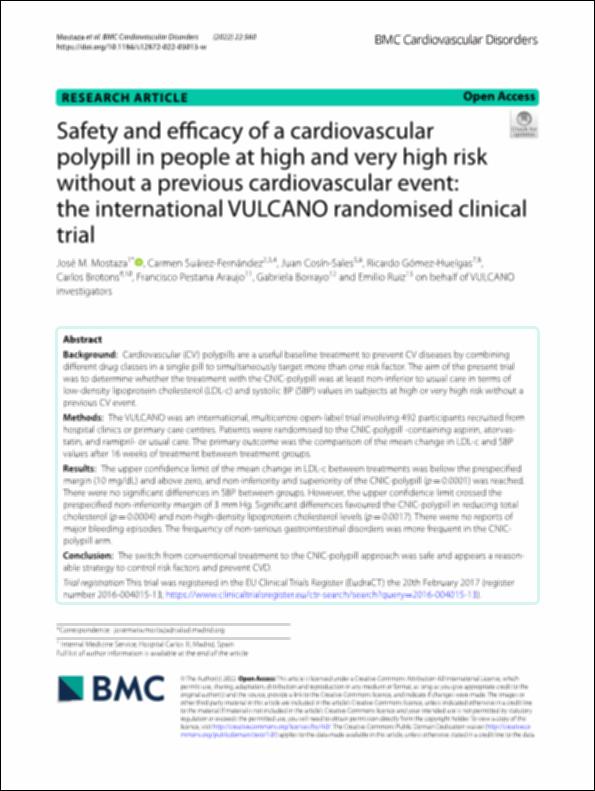Por favor, use este identificador para citar o enlazar este ítem:
http://hdl.handle.net/10637/14366Safety and efficacy of a cardiovascular polypill in people at high and very high risk without a previous cardiovascular event the international VULCANO randomised clinical trial
| Título : | Safety and efficacy of a cardiovascular polypill in people at high and very high risk without a previous cardiovascular event the international VULCANO randomised clinical trial |
| Autor : | Mostaza Prieto, José María Suárez Fernández, Carmen Cosín Sales, Juan Gómez Huelgas, Ricardo Brotons Cuixart, Carlos Pestana Araujo, Francisco |
| Materias: | Enfermedades cardiovasculares - Prevención.; Cardiovascular system - Diseases - Prevention.; Enfermedades cardiovasculares - Factores de riesgo.; Tablets (Medicine); Medicamentos - Dosificación - Formas.; Drugs - Dosage forms.; Cardiovascular system - Diseases - Risk factors.; Pastillas (Farmacia) |
| Editorial : | Springer Nature |
| Citación : | Mostaza, J. M., Suárez-Fernández, C., Cosín-Sales, J., Gómez-Huelgas, R., Brotons, C., Araujo, F. P., Borrayo, G., Ruiz, E. & VULCANO investigators (2022). Safety and efficacy of a cardiovascular polypill in people at high and very high risk without a previous cardiovascular event: the international VULCANO randomised clinical trial. BMC Cardiovascular Disorders, vol. 22, i. 1 (22 dec.), art. 560. DOI: https://doi.org/10.1186/s12872-022-03013-w |
| Resumen : | Background: Cardiovascular (CV) polypills are a useful baseline treatment to prevent CV diseases by combining different drug classes in a single pill to simultaneously target more than one risk factor. The aim of the present trial was to determine whether the treatment with the CNIC-polypill was at least non-inferior to usual care in terms of low-density lipoprotein cholesterol (LDL-c) and systolic BP (SBP) values in subjects at high or very high risk without a previous CV event. Methods: The VULCANO was an international, multicentre open-label trial involving 492 participants recruited from hospital clinics or primary care centres. Patients were randomised to the CNIC-polypill -containing aspirin, atorvastatin, and ramipril- or usual care. The primary outcome was the comparison of the mean change in LDL-c and SBP values after 16 weeks of treatment between treatment groups. Results: The upper confidence limit of the mean change in LDL-c between treatments was below the prespecified margin (10 mg/dL) and above zero, and non-inferiority and superiority of the CNIC-polypill (p = 0.0001) was reached. There were no significant differences in SBP between groups. However, the upper confidence limit crossed the prespecified non-inferiority margin of 3 mm Hg. Significant differences favoured the CNIC-polypill in reducing total cholesterol (p = 0.0004) and non-high-density lipoprotein cholesterol levels (p = 0.0017). There were no reports of major bleeding episodes. The frequency of non-serious gastrointestinal disorders was more frequent in the CNICpolypill arm. Conclusion: The switch from conventional treatment to the CNIC-polypill approach was safe and appears a reasonable strategy to control risk factors and prevent CVD. |
| Descripción : | Este artículo se encuentra disponible en la siguiente URL: https://bmccardiovascdisord.biomedcentral.com/articles/10.1186/s12872-022-03013-w En este artículo de investigación también participan: Gabriela Borrayo y Emilio Ruiz en representación del grupo de investigadores VULCANO. |
| URI : | http://hdl.handle.net/10637/14366 |
| Derechos: | http://creativecommons.org/licenses/by/4.0/deed.es |
| ISSN : | 1471-2261 (Electrónico) |
| Idioma: | es |
| Fecha de publicación : | 22-dic-2022 |
| Centro : | Universidad Cardenal Herrera-CEU |
| Aparece en las colecciones: | Dpto. Medicina y Cirugía |
Los ítems de DSpace están protegidos por copyright, con todos los derechos reservados, a menos que se indique lo contrario.


